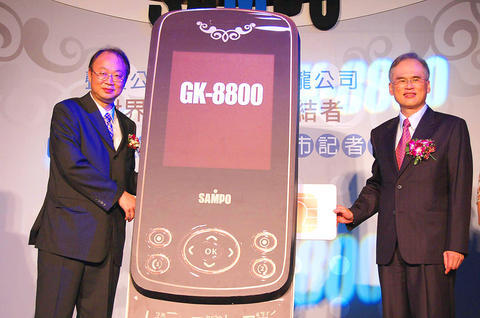Sampo Corp (聲寶), one of the nation's leading home appliance makers, is working toward cutting losses this year, a company executive said yesterday.
"We will continue to dispose of unprofitable affiliates or assets in an aggressive manner in order to create more values for our shareholders," Sampo spokesman Michael Chen (陳柏蒼) said yesterday.
Sampo's plans include disposing of a 3,150-ping (10,410m2) piece of land located in Banchiao, Taipei County.

PHOTO: WANG PEI-HUA, TAIPEI TIMES
The appliance maker is set to hold an open bidding in the third quarter for the land, which was evaluated as being worth NT$1 million (US$30,000) per ping last year, Chen said, adding that the sales would be booked in the current fiscal year.
The sale of the idle factory land will bring in an estimated NT$1.5 billion to NT$2 billion for Sampo, the Chinese-language Commercial Times reported on May 11.
Sampo posted a net loss of NT$4.1 billion last year and lost NT$4.92 per share.
In 2005, the company lost a net of NT$5.46 billion, or NT$6.55 per share.
For the first four months of this year, Sampo posted sales of NT$3.99 billion, a 13 percent decline from the same period last year.
Affiliates Sampo Technology Inc (
Chen said the number of employees at Sampo Technology -- a flat-panel TV and monitor maker in which Sampo holds 69 percent stake -- has been reduced to fewer than 20 from 250 last year.
To return to profitability, Sampo intends to increase sales of products with higher profit margins, including variable-frequency refrigerators and air conditioners, as well as plasma and liquid-crystal-display televisions with larger screens, Chen said.
"Sales of these high-margin products will take up 10 percent of all sales, up from only 1 percent last year," he added.
The home appliance maker is also turning its attention to the consumer electronics sector by introducing new cellphone handsets.
Sampo launched the GK8800 model yesterday, a GSM phone with two SIM card slots that is targeted at business travelers.
"There are around 5 million users here who have two SIM cards. They no longer need to carry two phones with them with our new handset," said Huang Pao-chang (黃寶璋), general manager of Polon Electric Corp (寶瀧), the distributor of Sampo phones.
Sampo, a small player in Taiwan' s handset market, aims to sell 100,000 handsets by year' s end, up from last year' s 70,000, Chen said.
The company's shares closed up 1.15 percent to NT$6.12 on the Taiwan Stock Exchange yesterday.

Taiwanese suppliers to Taiwan Semiconductor Manufacturing Co. (TSMC, 台積電) are expected to follow the contract chipmaker’s step to invest in the US, but their relocation may be seven to eight years away, Minister of Economic Affairs J.W. Kuo (郭智輝) said yesterday. When asked by opposition Chinese Nationalist Party (KMT) Legislator Niu Hsu-ting (牛煦庭) in the legislature about growing concerns that TSMC’s huge investments in the US will prompt its suppliers to follow suit, Kuo said based on the chipmaker’s current limited production volume, it is unlikely to lead its supply chain to go there for now. “Unless TSMC completes its planned six

Intel Corp has named Tasha Chuang (莊蓓瑜) to lead Intel Taiwan in a bid to reinforce relations between the company and its Taiwanese partners. The appointment of Chuang as general manager for Intel Taiwan takes effect on Thursday, the firm said in a statement yesterday. Chuang is to lead her team in Taiwan to pursue product development and sales growth in an effort to reinforce the company’s ties with its partners and clients, Intel said. Chuang was previously in charge of managing Intel’s ties with leading Taiwanese PC brand Asustek Computer Inc (華碩), which included helping Asustek strengthen its global businesses, the company

Power supply and electronic components maker Delta Electronics Inc (台達電) yesterday said second-quarter revenue is expected to surpass the first quarter, which rose 30 percent year-on-year to NT$118.92 billion (US$3.71 billion). Revenue this quarter is likely to grow, as US clients have front-loaded orders ahead of US President Donald Trump’s planned tariffs on Taiwanese goods, Delta chairman Ping Cheng (鄭平) said at an earnings conference in Taipei, referring to the 90-day pause in tariff implementation Trump announced on April 9. While situations in the third and fourth quarters remain unclear, “We will not halt our long-term deployments and do not plan to

TikTok abounds with viral videos accusing prestigious brands of secretly manufacturing luxury goods in China so they can be sold at cut prices. However, while these “revelations” are spurious, behind them lurks a well-oiled machine for selling counterfeit goods that is making the most of the confusion surrounding trade tariffs. Chinese content creators who portray themselves as workers or subcontractors in the luxury goods business claim that Beijing has lifted confidentiality clauses on local subcontractors as a way to respond to the huge hike in customs duties imposed on China by US President Donald Trump. They say this Chinese decision, of which Agence